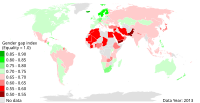
Photo from wikipedia
Abstract This paper examines the effects of sibship composition and birth order on the school enrolment and educational attainment of children, using data from the Vietnam Population and Housing Census… Click to show full abstract
Abstract This paper examines the effects of sibship composition and birth order on the school enrolment and educational attainment of children, using data from the Vietnam Population and Housing Census 2009. Utilizing an instrumental variable estimation method to address the endogeneity of sibship size, we find that it has a significant, negative effect on child education. Examining the impact of sibling sex composition, we find that having an additional boy lowers children’s average educational attainment for both girls and boys. We establish that birth order has a significant, negative effect on child educational attainment, although that effect seems to vanish with the youngest sibling. Our findings have several policy implications. First, the negative effect of sibship size on education implies that Vietnam’s lower fertility rate, the result of family planning policy during the 1990s and 2000s, may contribute to its remarkable educational achievements. Second, we find that birth order and sibling sex composition are more important than sibship size in children’s educational outcomes. As parents disproportionately allocate more resources for boys and earlier born children, government-targeted programs should tackle those issues to provide equal school opportunities for all children.
Journal Title: International Journal of Educational Development
Year Published: 2021
Link to full text (if available)
Share on Social Media: Sign Up to like & get
recommendations!